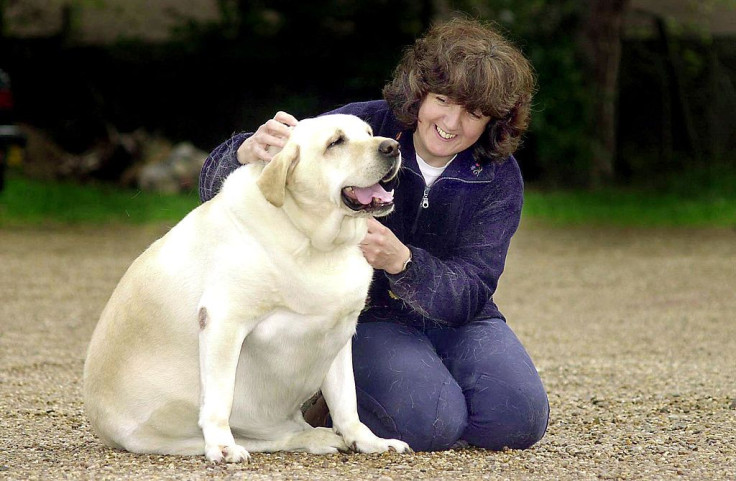Pet Obesity A Growing Problem: Exercise Ideas For Pet Dogs And Cats

It’s true. Many Americans will choose dogs that look most like themselves.
You can find proof of this widely-accepted statement among your family and friends, and wherever you look. You just need an observant eye.
Now, we find that the obesity epidemic plaguing adult Americans continues plaguing their dogs, as well -- and has been going on for quite some time with no signs of slowing down.
The latest annual survey by the Association for Pet Obesity Prevention (APOP) shows a stunning 56 percent of dogs in America are classified as either overweight or obese. The same holds true for 60 percent of cats.
And that’s because most American pet owners still cling to the long-disproven equation that “Love = Food.” Vets, however, will tell you otherwise every time.
Dr. Ernie Ward, the North Carolina vet who founded APOP, is emphatic when he declares food does not equal love.
"We have an emotional bond with food that's unique to the human species," said Dr. Ward. "Champagne with celebrations, cakes with birthdays, turkeys with holidays. We naturally transfer that context to our pets. But they don't celebrate anniversaries. They just love the food."
Dr. Ward said APOP is seeing more dogs and cats falling into the obesity category. He says obesity is where the greatest risk lies.
"We're encountering more weight-related diseases like high blood pressure, diabetes, arthritis, cancers and kidney disease,” he revealed.
To combat the rising wave of dog obesity, Dr. Ward recommends what he calls "parallel solutions" that will benefit both man and dog.
"Many of these things are things you should be considering for yourself as well," he said. "If you modify how often you walk your dog, you'll both gain additional benefits. If we raise awareness of how we're feeding our dog or cat, maybe we'll be more mindful of our own eating practices."
In other words, dog owners should exercise more often with their dogs.
Dr. Ward also recommends diets to reduce calories in your dog, but not nutrients. This part isn’’t difficult at all, he says.
"You'll be surprised how precise the science is on this," said Dr. Ward.
He said vets can manipulate protein levels, fat levels, carbohydrate levels, fiber and add supplements. She also said there are a lot of sophisticated tricks available vets. Just ask.
Dr. Ward’s views on obesity were seconded by Dr. Deborah Linder, head of the Tufts University Obesity Clinic for Animals in North Grafton, Massachusetts.
"Our pets are actually suffering when they're overweight," she said. "It's not that a fat pet is a happy pet. Their quality of life really decreases, but it can increase again once we get the weight off."
Dr. Linder also has ideas on how to encourage owners to bond with their pets and demonstrate love without always resorting to food.
"Does seeing your pet happy have to come with a lot of calories?" she asked. "We have to do something with our pets that cause them to lose weight but doesn't take the joy out of the relationship."
Keeping your dog at healthy weight is important. A 2018 study of 12 common dog breeds found normal-weight dogs live five months to 2.5 years longer than overweight dogs.
APOP compiles statistics by gathering “body condition scores” (the cat-and-dog equivalent off our body mass index or BMI) of pets that visit their vets for a general wellness exam on a given day in October. A total of 1,560 dogs and 646 cats in 41 states were assessed in the latest survey.
Published by Medicaldaily.com



























